
|
|
11 December, 2002
11 December, 2002
I saw a beautiful, beautiful thing today, something I'd been waiting
to see for more than 2 years, since I knew I'd be coming here. But I
was sad not to share it with my wife, Gabriella, who appreciates the
beauty in everything. But she wouldn't like the cold: her idea of
freezing is anything below 55 degrees.
The wind has been, well, non-existant, the last few days, and I was
walking back from the Clean Air Lab after lunch, and I noticed the
air was sparkling. It was not snowing, but ICING. It doesn't exactly
snow here, not the six-sided flakes that grow from tiny water
crystals that we¸re used to in more temperate regions. No. What you
get here in this perpetually very cold and dry and high place, is the
formation of tiny clear ice crystals.
The ice crystals yesterday were so small, such a high surface area to
mass ratio (remember our coffee filter lab, physics slackers?), that
they barely fell. They mostly just slowly drifted across the air,
from my left to right, jangling in the sunlight. And if they were in
the right position, they had color. Zillions of little ice prisms! If
you've ever noticed spiderwebs colored in the sunlight, or even
better, seen when the baby spiders leave their "nest" and float
across the field on little trailers of silk, you might have some
ideas.
And looking up in the sky, the air was full of ice and sunlight, and
a big halo, the 22 degree halo, around the sun. To the right and left
of the sun, stuck to the halo, "sundogs": rainbows created by the
refraction of sunlight through the ice. And a rainbow directly above
me : the circumzenith arc. And a huge white ring going all the way
around the sky, as big as the sky, level with the sun, connecting the
sundogs.
Now, I've seen many pictures of these. And I can tell you that no
picture, no camera can capture what this looked like. Because the air
was full of ice and light, the spectral colors in the sundogs and
circumzenith arc came right to me. They seemed like bright ROY G BIV
wedges in the sky, stretching from my eyes to an infinite distance
away. And not solid, but composed of millions of little spinning,
drifting, sparkling ice wedges.
I tried my best to take some pictures and movies of what this looked
like, and if you look at one movie on the drachen site, look at
sundogs. But not every wonderful thing can be recorded and digitized
and stored.
And that's not a bad thing.
Well, more work on detectors, and planning for live streaming
webcasts tomorrow, and tours of the Clean Air Lab and the AST/RO
sub-millimeter band radio telescope, and plans to go along with a
mini-expediton on Friday that will go overland 20 km away from the
station to measure snow pack.
But it was all about the sundogs today.
Daddy misses his family and the nice dark nighttime that helps him to sleep!
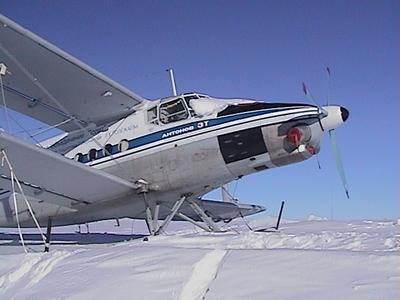
Bai told me (and he would know) that this Russian plane had mechanical trouble during its flight, and put down here at the Pole a couple of years ago. The Russians were flown out, then given a transportation bill for $ 10,000 apiece. They of course didn't pay, since they were already home, so their plane sits here as collateral. The Russians maintain a base on the highest part of the Antarctic plateau, at about 12,000 feet altitude. They used to keep it open year round, but it's now just a summer facility.
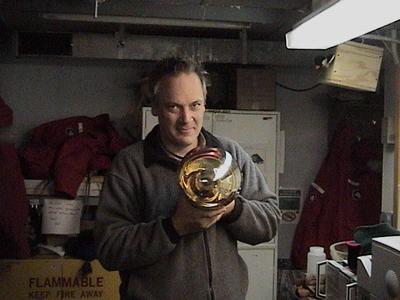
And here's the PMT, removed from the OM. The inside of the glass dome is coated with a yellowish photoelectric material. In other words, when a photon of light strikes that material, it knocks loose a few electrons. The base of the PMT then builds up those few initial electrons into an avalanche. That's electricity, and that can be recorded. So even one photon of light, which your eyes couldn't even detect, is amplified into a measurable electrical signal.
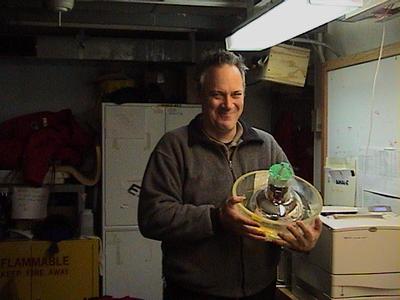
Here's the OM, the optical module, that houses the PMT that we're working with. The PMT's job is to detect the very faint light made my high energy parcticles as they pass through the ice. The OM holds the PMT and all its electronics in an unbreakable case.
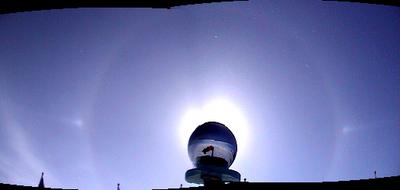
No picture (any certainly not this one) does any justice to how stunning these ice halos are.
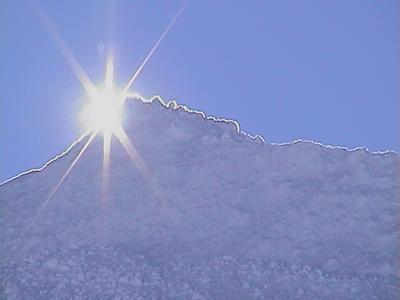
The quality of light here is amazing. It never quits, never a cloud in the sky, and it reflects of every little ice crystal. Bewildering, waking up at 3 in the morning to full-on blazing solar fury.
Contact the TEA in the field at
.
If you cannot connect through your browser, copy the
TEA's e-mail address in the "To:" line of
your favorite e-mail package.
|
